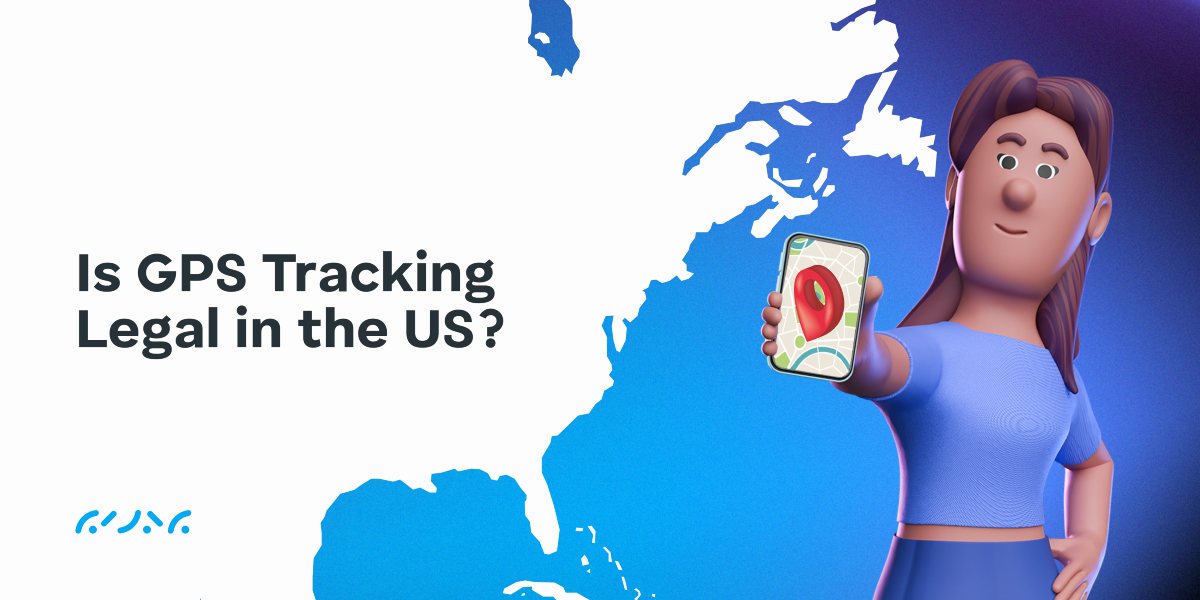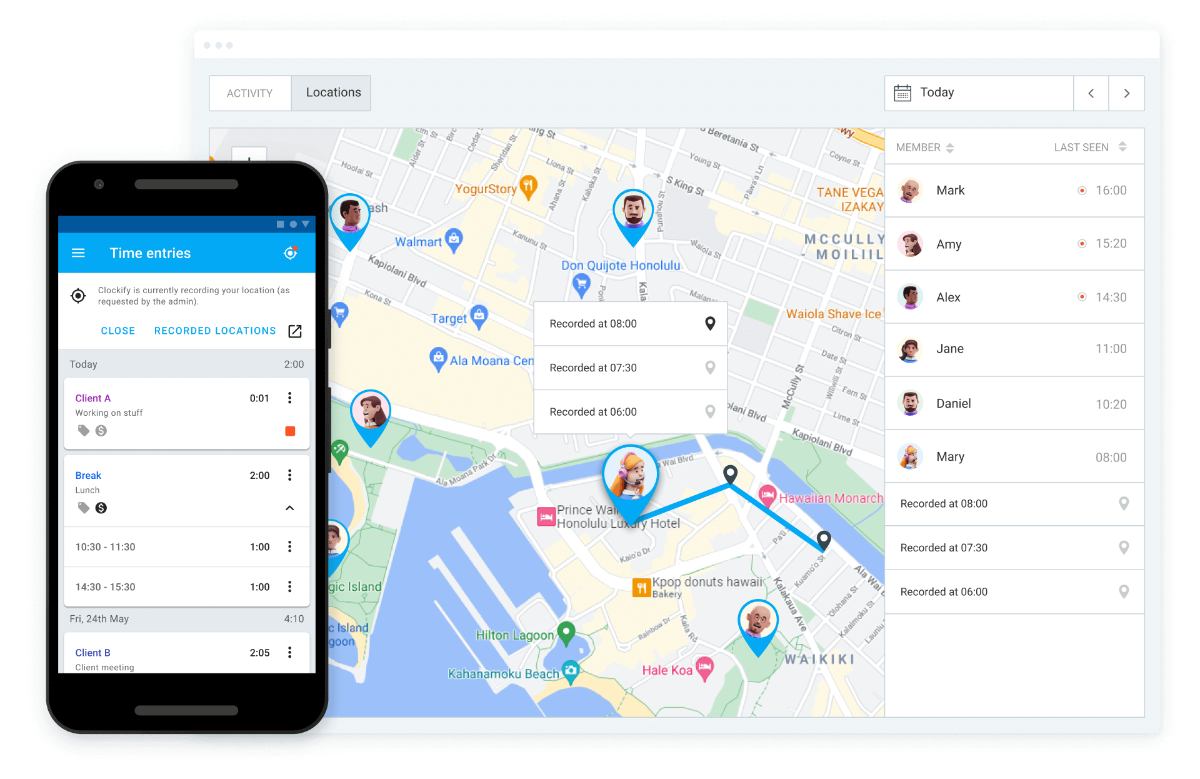If you’re about to introduce a GPS tracking system at your company, you’re probably troubled by a variety of questions, such as:
“Are GPS trackers legal?”
“Is tracking someone illegal?”
“Are there even any benefits of GPS tracking?”
But fear not! We’ve got you covered.
We bring you all federal GPS tracking laws to help you waive any uncertainty and remain compliant.

GPS tracking laws by state
Here’s the breakdown of all GPS tracking laws by state.
Alabama
Using GPS tracking to track your employees is allowed in Alabama.
However, the Alabama code 13A-11-32 states that electronic surveillance is illegal if the person is in private territory. This means that you can track your employees as long as they’re not on private property.
Track work hours with Clockify
Alaska
Are you operating a business in Alaska and want to track your employees’ location with a GPS tracking device? You can do so as long as you have their consent.
Under Alaska Statute 11.41.270, it’s illegal to track the location of a person if that can lead to a person feeling the fear of death or physical injury and if it’s non-consensual.
According to the same statute, using or installing a device for monitoring or recording events occurring in the vehicle or workplace or on a personal phone or computer is considered stalking.
Arizona
In Arizona, it’s legal to track your employees’ location if you have their consent.
Specifically, under the Arizona code 13-2923, you need to have authorization to use GPS tracking if you monitor a person for longer than 12 hours or on more than 2 occasions.
Monitoring, in this case, means using any electronic, digital, or GPS device to monitor either a person or the person’s internet or wireless activity.
Arkansas
Arkansas has no laws prohibiting GPS tracking of employees via cell phones. In this case, although it’s not illegal, you should get consent from employees to be on the safe side.
When it comes to tracking vehicles, the Arkansas code 22-8-105 states that a GPS tracking device can be installed only in state-owned vehicles.
California
In California, it’s legal to track your employees’ location if you’ve obtained their consent.
Particularly, the Penal Code Section 637.7 states that tracking a person with an electronic tracking device is considered illegal unless you have their consent.
In this case, an electronic tracking device means any device that’s attached to a vehicle or any other movable thing that reveals its location.
In fact, you must obtain consent even if you’re using company-owned vehicles or mobile phones.
Colorado
It’s legal to use GPS tracking in Colorado.
First of all, Vonnie’s law doesn’t prohibit employers from introducing GPS tracking. Yet, if such an action causes a person to suffer from emotional distress, GPS tracking is considered stalking.
To illustrate, emotional distress occurs when a person is in fear of their own safety or the safety of their immediate family (spouse, parents, grandparents, sibling, or child).
Connecticut
It’s legal to use GPS tracking for your employees in Connecticut if you notify them and don’t cause emotional stress. In particular, 2 laws address this:
- Public Act 21-56 prohibits tracking someone using GPS if that can cause them emotional distress, and
- Electronic Monitoring Act requires employers to notify their workers about online monitoring, including GPS tracking. No consent is needed from the employees.
The Public Act 21-56 defines emotional distress as significant mental or psychological suffering or distress.
To be on the safe side, if you’re a business owner in Connecticut, ask for consent from your employees before GPS tracking.
Delaware
It’s legal to track your employees’ location in Delaware as long as you have their consent.
According to Chapter 5 of the Delaware Criminal Code, Title 11, unless you’re with law enforcement or a guardian monitoring a child in Delaware, you need consent before installing a GPS tracking device.
Florida
In Florida, tracking your employees with GPS is legal.
Although Florida Title 934.425 prohibits tracking a person without their consent, there’s an exception for employers acting in good faith on behalf of a business — for business purposes.
Title 934.425 defines tracking as determining the location or movement of an individual. In your case, this means the employees’ location or movement.
Hawaii
If you’re planning to start tracking your employees’ location in Hawaii, get their consent to comply with the law.
Namely, the Hawaii Revised Statute Section 803-42 prohibits GPS tracking if you don’t have consent from the person being tracked.
Idaho
Idaho has no specific laws that prohibit GPS tracking.
According to Idaho Statute 18-6702, it’s illegal to track electronic communication, texts, and phone calls unless they’re business-related.
However, the said statute doesn’t mention GPS tracking in particular. This means that it’s not illegal to use GPS tracking, but it would be wise to get your employees’ consent beforehand.
Illinois
If you’re running a business based in Illinois, know that it’s legal to use GPS tracking if you have business-owned vehicles.
Statute 720 ILCS 5/21-2.5 allows employers to track employees operating business-owned vehicles. In this case, you don’t need consent from your employees.
The law doesn’t mention any other GPS tracking methods, such as phone apps. When the law doesn’t mention the specific situation you have, it’s best to have consent from your employees.
For example, even if you have company-owned cell phones, it’s better to have the employees’ consent.
Indiana
In Indiana, it’s legal use to use GPS tracking if you have consent from the person you track.
Namely, the Ind. Code 35-46-8.5-1 prohibits the use of GPS tracking devices without written consent.
Iowa
Business owners in Iowa are allowed to use GPS tracking for their employees.
The Iowa Code 708.11A states you need to have a legitimate purpose to be able to use GPS tracking on someone, and doing business is considered a legitimate purpose.
Kansas
Kansas employers are allowed to track their employees’ location during business hours.
Although Kansas Statute 21-5427 stresses that using electronic devices to locate someone is viewed as stalking, business owners are allowed to use GPS tracking since it’s considered to have a legitimate purpose.
This allows you, as a business owner, to use any electronic tracking system to determine your employees’ location and movement.
Kentucky
In Kentucky, it’s legal to track your employees’ location as long as you have their consent.
Specifically, under Ky Rev Stat 508.152, you must inform your employees and get their consent to use GPS tracking.
In Kentucky, tracking is defined as using an electronic or mechanical device that allows a person to remotely determine the location of another person.
Louisiana
Tracking employees’ location in Louisiana is legal only if you have their consent.
Namely, the LA Rev Stat 14:323 states that you can’t track a person without their consent.
In this statute, tracking a person is defined as determining the location or movement of the person that’s tracked.
Maine
GPS tracking of employees is legal in Maine.
Although Title 17-A: Maine Criminal Code doesn’t prohibit employers from introducing GPS tracking, if this action causes someone to suffer from emotional distress, GPS tracking is considered prohibited.
This code defines emotional distress as the mental or emotional suffering of the person being stalked that’s evidenced by fear, anxiety, torment, or apprehension.
Maryland
In Maryland, it’s legal to track your employees’ location only if you have their consent.
According to the Md Code, Crim. Law 3-802, using a tracking device to monitor a person without their consent is illegal.
If you don’t get consent from your employees, you may face a fine of up to $5,000 or 5 years in prison — or both.
Massachusetts
In Massachusetts, there’s no law prohibiting GPS tracking of employees during working hours.
However, Section 43A of Massachusetts General Laws states that it’s illegal to use electronic devices for tracking if that would cause substantial emotional distress.
Here are some of the symptoms of emotional distress:
- Depression,
- Anxiety,
- Weight gain or loss,
- Insomnia, and
- Chronic headaches.
The violation of Section 43A can result in imprisonment in a house of correction for no more than 2,5 years or even up to 10 years of imprisonment in a state prison.
Michigan
Are you planning to track your employees’ location in Michigan on company-owned devices?
If the answer is yes, you should know that this is legal and you don’t need consent from your employees.
According to the MCL Statute 750.539l, you don’t need consent from your employees to track company-owned vehicles. Still, if the vehicle isn’t company-owned, you need permission.
Minnesota
It’s legal to track your employees’ location if you have their consent.
Specifically, MN Statute 626A.35 allows GPS tracking if you have that person’s permission.
If you want to use a mobile tracking device or place a device in a motor vehicle, you need the consent of the phone’s owner or the driver of that motor vehicle.
Nevada
Imagine running your business the best way you can and then suddenly getting a lawsuit for illegally tracking your employees’ location.
It’s a possible scenario in Nevada, where tracking employees’ locations is only legal with their consent.
According to AB356, it’s unlawful to place and monitor a GPS tracking device without the person’s consent.
New Hampshire
In New Hampshire, it’s permitted to track your employees’ locations as long as you obtain their consent.
For illustration, the NH Rev Stat 570-A:2-a states that it’s illegal to install, place, or track a GPS device without prior consent from the person being tracked.
North Carolina
In North Carolina, it’s legal to track your employees with GPS as long as you have their permission.
Namely, NC Gen Stat 14-196.3 states that it’s considered illegal to track someone without their consent.
New Jersey
If you run a company in New Jersey, you won’t have to fear getting sued for tracking your employees’ location — as long as you have their consent.
If you run a company in New Jersey, under NJ Stat 34:6B-22, you’re not allowed to track a person’s location unless you’ve obtained their consent.
New York
It’s legal to track your employees’ location in New York as long as you have their permission.
In fact, NY Penal L 120.45 states that it’s prohibited to track someone using GPS tracking device without their consent.
Oklahoma
In Oklahoma, once the employees sign the consent, it becomes legal for you to track their location.
Particularly, OK Stat 21-1173 states that you can only use a GPS tracking device or other monitoring device if you have consent.
North Dakota
With your employees’ consent, it’s legal to track your employees’ location in North Dakota.
Namely, it’s considered stalking under the ND Cent Code 12.1-17-07.1 if tracking the person’s movements or location through GPS someone causes fear.
To illustrate this, It’s considered stalking if you frighten, intimidate, or harass a person on 2 or more occasions — and in continuation.
You must have a legitimate purpose when tracking someone because unauthorized tracking which causes fear of death or injury indicates the lack of legitimate purpose.
Oregon
Do you operate a business firm in Oregon? Before you start tracking your employees, don’t forget to get their consent — or you may get sued.
Under ORS 163.715, placing a GPS tracker in a motor vehicle without a person’s consent is considered an unlawful use of GPS.
Pennsylvania
Pennsylvanian employers, you shouldn’t worry about facing charges for illegal use of GPS trackers — if you have your employees’ consent.
Particularly, Title 18 stresses that it’s illegal to place GPS trackers on phones or motor vehicles without consent.
Rhode Island
Are you a business owner In Rhode Island? You should know it’s legal to use GPS tracking for your employees.
Namely, R. I. Gen. Laws 11-69-1 prohibits placing GPS trackers without consent but allows for an exception when it comes to business purposes.
Tracking employees’ location here means that an authorized business uses a tracking device to track vehicles that are business-owned or leased and driven by its employees.
South Carolina
As soon as you obtain their permission, it becomes legal to track your employees with GPS devices in South Carolina.
Specifically, Bill 3212 makes it illegal to install or place a GPS tracking device on a motor vehicle without an employee’s consent.
Tennessee
In Tennessee, once you’ve obtained consent from your employees, it’s legal to track their location.
Specifically, according to Tenn. Code Ann. 39-13-606, it’s illegal to install a GPS tracking device on a motor vehicle without consent.
Texas
Texas employers, you don’t have to worry about getting sued for GPS tracking your employees, as it’s legal to track their location — granted you have their consent.
Namely, according to the Penal Code Chapter 16, it’s illegal to install a GPS tracking device on a motor vehicle without the approval of the person you want to track.
Utah
Utah employers, if you don’t track your employees outside working hours and you’ve obtained their consent, you are not violating the law.
Particularly, according to the Utah Code 76-9-408, you need consent prior to installing a GPS tracking device on a motor vehicle.
Virginia
In Virginia, it’s legal to track your employees’ location if you have their consent.
Specifically, the Va. Code 18.2-60.5 doesn’t allow installing tracking devices without the person’s consent.
Washington
Did you forget to ask for consent from your employees before you tracked their location? If you tracked their location on company-owned devices in Washington, it’s legal, and you don’t even need consent.
Namely, House Bill 1696 dictates that employers can use GPS tracking devices on company-owned phones or motor vehicles.
On the other hand, it’s illegal to install or monitor an electronic tracking device without the person’s consent if you don’t own the vehicle or the cell phone in question.
Wisconsin
In Wisconsin, it’s legal to use GPS tracking with your employees if you have their consent.
In line with Wis. Stat. 940.315, it’s illegal to place a GPS tracking device on a vehicle owned by another person without their consent.
Wyoming
Tracking your employees’ location with GPS in Wyoming becomes legal the moment you obtain their consent.
To be more precise, WY Stat 6-2-506 dictates that any GPS device is illegal without the authorization of the person being tracked.
States with no GPS tracking laws
Here’s a list of states that haven’t yet introduced any laws regarding GPS tracking:
- Georgia,
- Mississippi,
- Missouri,
- Montana,
- Nebraska,
- Ohio, and
- West Virginia.
We consulted lawyer Ladislav Beganyi to determine what employers should do if they live in one of these states. He typically advises employers to get consent even if there are no laws requiring this:

“Where there are no laws specifically regulating GPS tracking, employers still need to exercise caution. I typically advise clients to get express written consent from employees before implementing any GPS tracking system.”
4 Most frequently asked questions about GPS tracking
To wrap up, here are some of the most commonly asked questions when it comes to GPS tracking.
What are the benefits of GPS tracking?
There are numerous benefits that come with a GPS tracking system, and we’ll list the most important ones:
- Time tracking in real-time — Transparent working hours, payroll accuracy, and increased productivity will enhance your business,
- Access to historical data — Easily analyze locations and routes your employees took by accessing GPS tracking history, and
- Management efficiency — It takes one quick look to determine whether everyone is where they need to be and act upon that information.
Are GPS devices an invasion of privacy?
When used properly, GPS devices aren’t an invasion of privacy.
Employees may experience mixed feelings in the beginning, but following the law and monitoring employees’ locations only during working hours is key.
Also, workers are more open to new technology when provided with clear explanations of why and how the changes will be implemented.
CEO of a fuel delivery company, Eliot Vancil, explained to us that employees were more open to GPS tracking once they told them it would be used only during working hours to improve service and employees’ safety:

‘’When we first started using GPS tracking, workers naturally worried about their privacy. We answered this by saying that the main goal was to make things safer and more efficient. Employees were more open to GPS tracking after it was made clear that it would only be used during work hours and would bring benefits.’’
Is it legal to track employees with GPS?
In most states, it’s legal to track employees with GPS if you have their consent. You can always consult with a lawyer before placing a GPS tracking device into a vehicle or installing software into your employees’ cell phones.
Can someone track your car without you knowing?
Placing a GPS tracking device on a vehicle is possible. More and more laws are emerging to protect people from unlawful tracking.
Most states prohibit installing GPS tracking devices without the person’s consent. If you suspect that you’re being tracked illegally, contact the authorities as soon as possible.
Simplify the GPS tracking process with powerful software
In most states, using GPS for tracking purposes is legal as long as you have consent.
Once you obtain consent from your employees, the next step is finding an easy-to-use, reliable GPS tracking software.
Our award-winning Clockify takes the spotlight here, as it’s a powerful software for time and location tracking. Here are some of the advantages of using Clockify GPS tracking feature:
- Employees can easily clock in via apps on their mobile phones,
- Locations are stored for up to 7 days, so you can analyze them afterward, and
- Location history is automatically deleted for good after 7 days, leaving no fear of privacy intrusions.

Finally, there’s no reason for you to play a guessing game about whether your on-the-field workers arrived at their location anymore.
How we reviewed this post: Our writers & editors monitor the posts and update them when new information becomes available, to keep them fresh and relevant. Published: July 19, 2024
Published: July 19, 2024 
